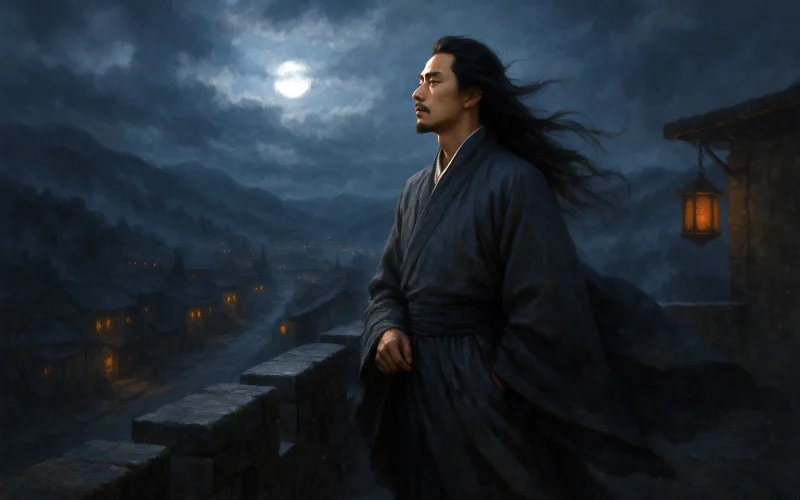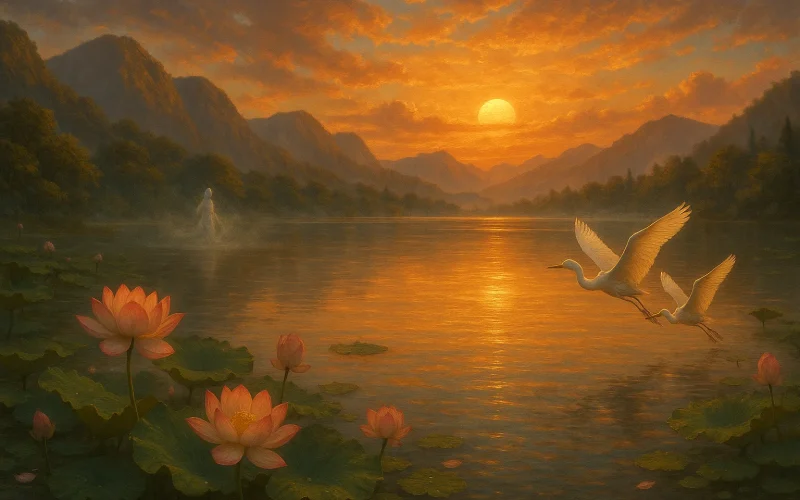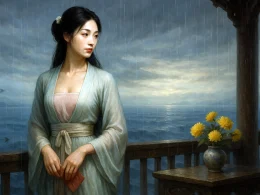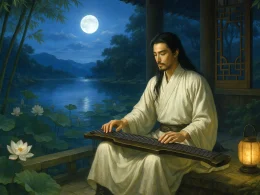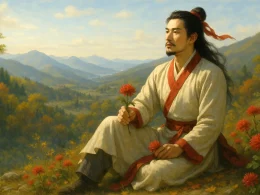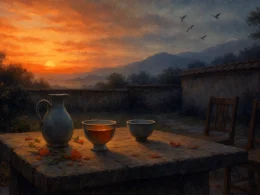Hangzhou’s lanterns blaze on the fifteenth night,
Moonlight like frost paints faces in silver light.
Under silk canopies, musk-scented flutes play—
No dust follows horses galloping away.
Now in this lonely mountain town, old and bleak,
Drums and pipes lead to farms, humble and meek.
Lamps grow cold, frost descends with sparse light,
Clouds hang low—a snow-laden night.
Original Poem
「蝶恋花 · 密州上元」
灯火钱塘三五夜,明月如霜,照见人如画。
帐底吹笙香吐麝,更无一点尘随马。寂寞山城人老也!击鼓吹箫,却入农桑社。
苏轼
火冷灯稀霜露下,昏昏雪意云垂野。
Interpretation
Composed in 1075 during Su Shi's tenure as prefect of Mizhou, this cí articulates the cultural dislocation of a southern literatus governing northern hinterlands. Written on the Lantern Festival—China's most exuberant urban celebration—the poem constructs a diptych contrasting Hangzhou's sensory splendor with Mizhou's rustic austerity. Through this juxtaposition, Su Shi pioneers a new lyric mode: the "nostalgia of governance," where personal memory and official duty collide.
Upper Stanza: "灯火钱塘三五夜,明月如霜,照见人如画。帐底吹笙香吐麝,更无一点尘随马。"
Dēnghuǒ Qiántáng sānwǔ yè, míngyuè rú shuāng, zhào jiàn rén rú huà. Zhàng dǐ chuī shēng xiāng tǔ shè, gèng wú yīdiǎn chén suí mǎ.
Hangzhou's lanterns on the fifteenth night—
Moonlight frost-bright,
Painting promenaders in silver strokes.
Behind curtains, sheng pipes exhale musk perfume,
Not a speck of dust chases hooves.
Here, Hangzhou materializes as a gilded dreamscape: "frost-bright" moonlight (明月如霜) transforms citizens into living art, while the absence of dust ("not a speck") hyperbolizes urban refinement. The synesthetic blend of visual ("lanterns"), auditory ("pipes"), and olfactory ("musk") luxuries underscores what Su Shi has lost—and what Mizhou lacks.
Lower Stanza: "寂寞山城人老也!击鼓吹箫,却入农桑社。火冷灯稀霜露下,昏昏雪意云垂野。"
Jìmò shānchéng rén lǎo yě! Jīgǔ chuīxiāo, què rù nóngsāng shè. Huǒ lěng dēng xī shuānglù xià, hūnhūn xuě yì yún chuí yě.
This mountain town's solitude ages me!
Drums and flutes
Lead only to harvest prayers.
Fires dwindle, lanterns thin under crystal dew,
Snow-thickened clouds sag over fields.
The stanza pivots to Mizhou's stark reality: communal "harvest prayers" (农桑社) replace urban entertainment, while "sagging" clouds (云垂野) embody bureaucratic weight. The paradoxical "snow-thickened" (雪意) clouds—at once ominous and hopeful—mirror Su Shi's conflicted duty: lamenting cultural deprivation while anticipating agricultural renewal.
Holistic Appreciation
This lyric poem constructs its artistic vision through a striking spatial contrast. The first stanza nostalgically recalls the Lantern Festival in Hangzhou—a scene of resplendent lights, bustling crowds, fragrant carriages, and melodious pipes, all evoking an atmosphere of dazzling prosperity. The second stanza shifts abruptly to depict the same festival in Mizhou: a desolate mountain town with sparse drums and flutes, where villagers gather to pray for harvests under frost-laden clouds, creating a starkly austere setting.
The poet transcends mere environmental description, embedding complex emotions within this juxtaposition: nostalgia for past splendor intertwines with concern for local hardships; personal displacement merges with silent prayers for agricultural bounty. The line "aging in this lonely mountain town" particularly reveals the poet's inner solitude and melancholy—the weariness of bureaucratic wanderings contrasting with inescapable folk struggles.
Most movingly, the poem refuses to succumb to pessimism. From the natural imagery of "snow-laden clouds hanging low", Su Shi extracts quiet hope, balancing sorrow with optimism—a testament to his characteristic philosophical resilience.
Artistic Merits
- Dramatic Contrast, Seamless Transition
The Hangzhou-Mizhou dichotomy creates visceral tension—luxury versus austerity—while maintaining organic narrative flow, showcasing Su Shi's structural mastery. - Scenic Introspection, Psychological Landscaping
Frost-like moonlight, musk-like fragrances, and snow-suggestive clouds function simultaneously as literal descriptions and psychological mirrors. Lines like "aging in this lonely town" transform nature into soulful soliloquy. - Linguistic Alchemy, Layered Meanings
"Not a speck of dust follows the horses" brilliantly conveys both environmental purity and Jiangnan's refined lifestyle; "drums and pipes leading to harvest prayers", while documenting rural rites, carries profound folk reverence through deceptively simple phrasing. - Unconstrained Technique, Emotional Authenticity
Rejecting formal rigidity, the poem employs irregular line lengths and temporal shifts, blending memory with immediate reality—a hallmark of Su Shi's "brush following thought" creative philosophy.
Insights
This work teaches that splendor may be illusory while solitude holds substance. Between nostalgia and reality, Su Shi neither dwells on bygone glory nor shuns present austerity, instead demonstrating clear-eyed social observation and deep humanitarian commitment. Without explicit lament, every line pulses with conscientious care—revealing the poet's moral backbone as literati-official.
It further reminds us that artistic power resides not in sensory opulence but in rendering emotional gravity through ordinary sights. This ability to distill cosmic warmth and human burden from local phenomena defines Su Shi's monumental legacy. The poem ultimately frames literary creation as ethical practice—where aesthetic achievement intersects with social responsibility.
About the Poet
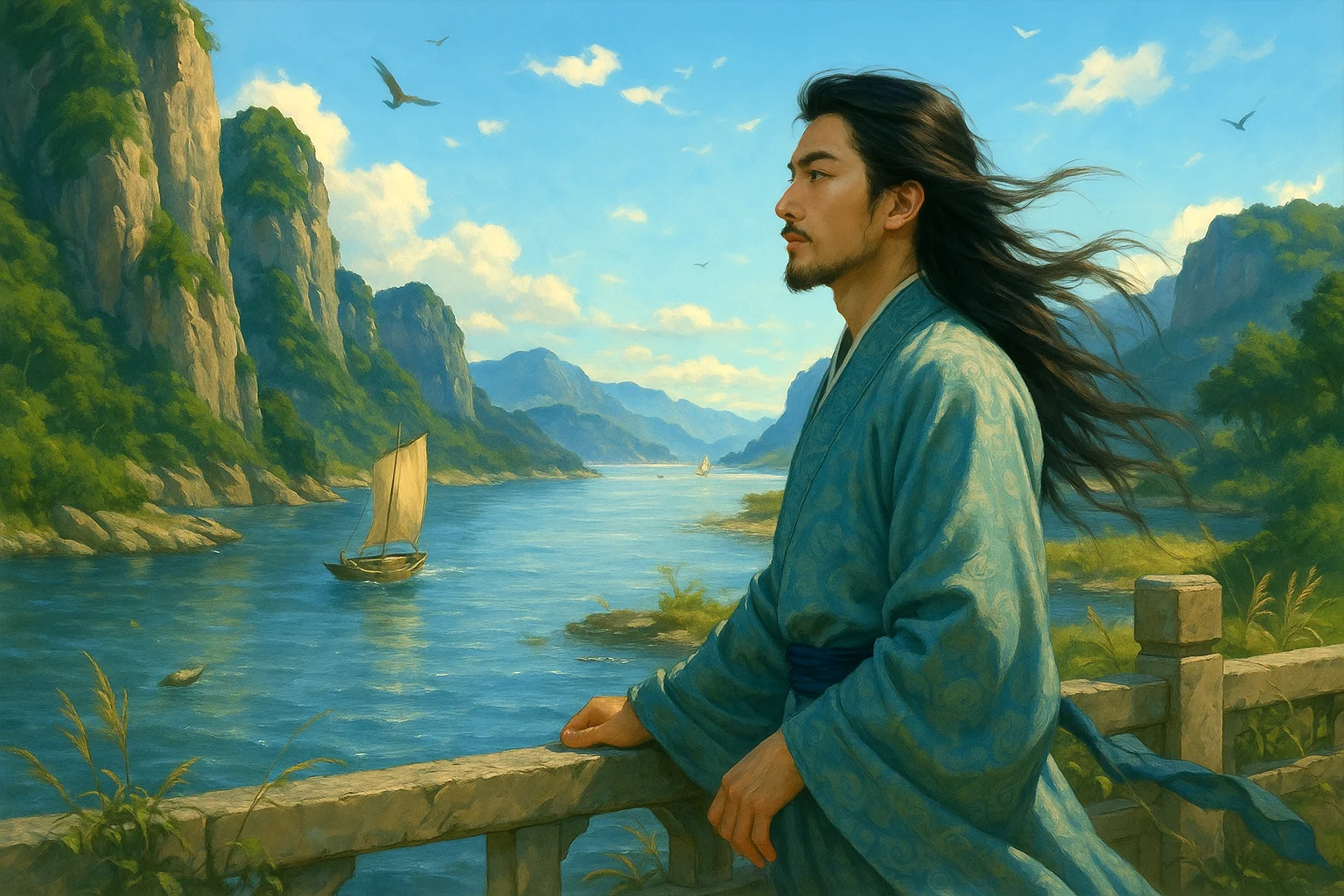
Su Shi (苏轼, 1037 - 1101), a native of Meishan in Sichuan, was a polymath of the Northern Song literary world. His prose was expansive and unrestrained, his poetry fresh and vigorous, and his ci poetry pioneered the bold and unconstrained style. In calligraphy, he created the "Su Style," and in painting, he championed "spiritual resonance," earning him a place among the "Four Masters of the Song." Despite repeated political persecutions—most notably the "Poetry Case of the Black Terrace"—his exile to Huangzhou, Huizhou, and Danzhou yielded timeless masterpieces. Lu You praised him as "the literary patriarch of an era."






